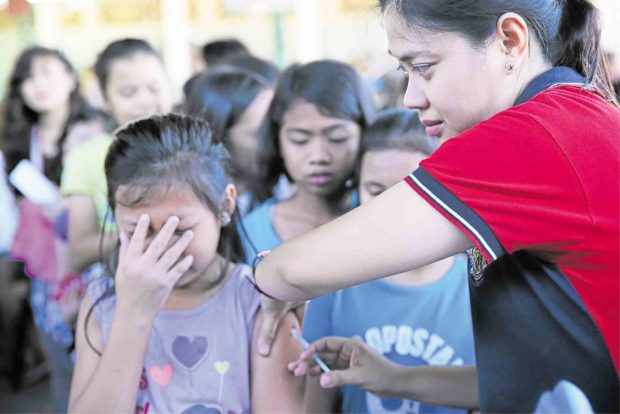
In this April 2016 photo, a nurse in the City of San Fernando in Pampanga province injects a student with Dengvaxia as part of a Department of Health program. —CONTRIBUTED PHOTO
CITY OF SAN FERNANDO—Gov. Lilia Pineda on Thursday asked the provincial board to set aside an initial P2 million for emergency medical assistance to pupils who were injected with the dengue vaccine Dengvaxia and might suffer complications.
Pineda said she also asked the Department of Education in Pampanga province to give her a list of 224,000 Grade 4 or 9-year-old pupils who were vaccinated with Dengvaxia in April and October in 2016 and in March this year.
The Duterte administration stopped the dengue vaccination program, after Dengvaxia’s manufacturer, French company Sanofi Pasteur, issued an advisory about the risks it posed on people with no previous dengue infections.
Pineda on Thursday said she was mobilizing 11,000 Bantay Bayan (village watchmen) and more than 10,000 volunteers to find the students and check their health conditions.
“If you have village mates, especially young children who have fever, do not waste another day. Bring them immediately to our provincial and district hospitals for treatment. If they had antidengue vaccine but still got sick with dengue, bring them to our hospitals,” she said.
Vice Gov. Dennis Pineda, presiding officer of the provincial board, said the fund request for the emergency dengue program would be tackled by the board next week.
Former Health Secretary Enrique Ona had said that a study on the dengue vaccine efficacy was conducted in five Asian countries, including the Philippines. At least 3,500 children in Cebu and San Pablo cities were given the vaccine for testing.
Among 10,275 children, more than half of the subjects did not get dengue compared to the group that did not receive the vaccine, Ona said.
The study also showed that after three doses, the vaccine reduced the possibility of developing dengue hemorrhagic fever by 88.5 percent, based on World Health Organization criteria. There was a 67-percent drop in the risk of hospitalization due to dengue during the observation period.
The Philippines established the national dengue prevention and control program in 1993. Between 2011 and 2015, 220 Filipinos on the average were infected by the virus daily.
A study in 2014 showed that the average cost of treatment per patient was P18,405, or around P16 billion a year. The amount excluded the indirect costs for transportation and food, the cost of being absent from work, lost productivity due to illness and premature death, and increased health care cost. —TONETTE OREJAS